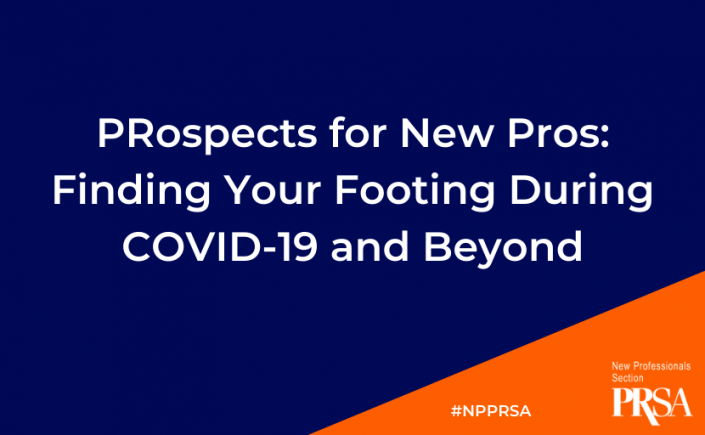On Wednesday, April 7, 2021, public relations professionals came together virtually to discuss current hiring trends and how to move forward during COVID-19 and beyond. The webinar, sponsored by the New Professionals Section of the Public Relations Society of America (PRSA), brought together four experienced PR professionals who shared their experiences and tips with new professionals.
Webinar panelists included Taylor Bryant, an assistant professor (clinical track) in the mass communications department at the University of West Georgia; Kirk Hazlett, APR, adjunct professor of communication at the University of Tampa; Christina Stokes, Vice President and Director of Talent Acquisition at Rubenstein; and Mike Neumeier, APR, CEO of Arketi Group.
With the current COVID-19 pandemic, many new professionals have struggled to find their footing, whether as new graduates looking for employment or employed new professionals looking for ways to hone relevant skills and advance their careers. Stokes said that, despite the challenges over the past year, “things are looking up.”
Bryant reminded recent graduates that the virtual workplace forced onto companies by the pandemic has created an environment where new professionals in particular can excel. “The virtual environment for us is new, but for students, they are tech savvy…you have what it takes in terms of the technical aspects.” And that’s a huge advantage.
Seek Out Professional Development Opportunities
Hazlett said that, while companies may not be hiring as much because of the pandemic, there are still ways to get ahead in your professional careers. For example, while internships are not jobs, Hazlett said, “it doesn’t hurt to add more experience to your resume.” Every panelist encouraged new professionals to find ways to use this time to take advantage of the unique opportunities provided by the pandemic, such as online conferences and certificate programs.
New professionals should specifically focus on ways to develop professionally that will help get you where you want to be in your careers. “It’s important to know your why and what. What you want to do next and why you want to do it,” said Bryant. She recommended finding a few desirable jobs and looking at their roles, responsibilities, and required skills, and then taking a look at where you can improve and get professional development in those areas. “It’s like mapping your career,” said Bryant.
Make Networking Part of Your Plans
As part of your professional growth, new professionals should focus on networking and making connections. “I believe in authentic connections,” said Bryant. “Focus on building genuine relationships. People are more likely to recommend you when they know you and have a real relationship with you.”
Stokes emphasized the benefit of using LinkedIn to stay connected once you’ve established those relationships. “Stay connected to them…it takes work, but opportunities will come to you that will help elevate you in your career.” Neumeier added that networking “is a numbers game, like the lottery. If you don’t play, you can’t win.”
Neumeier also said that being part of groups like the PRSA New Professionals Section is key because “these are your peers. These are the people you’re going to grow up in the industry with…take advantage of that and use your network,” said Neumeier.
Aside from insights into professional growth and networking, panelists also provided advice for landing jobs early in your new professionals’ careers.
Interviewing Insights for New Pros
When it comes to interviewing, Bryant says to practice. She recommended writing down a list of essential things you want your potential employer to know about you, and then compare that to common interview questions so you can practice making sure those essential points come up during the interview.
Hazlett said that potential candidates make an impression when they come prepared to ask their own questions.
Stokes added, “Interviewing is a conversation with a potential colleague. So look at it that way and it might make you feel more comfortable.” She also recommended doing research about the interviewer and the company. “What’s interesting about them to you and why? I love having a conversation with a candidate and learning what they’re interested in about the company,” said Stokes.
Virtual interviews can present its own set of challenges, but the panelists encouraged new professionals to make the most of it. Make sure your room is clean and that what the camera captures is professional. Virtual interviews can be problematic, but panelists say that’s just part of how things are. “We’re at a weird time where home is work and work is home and the lines are blurred. The reality is that you can’t avoid crying kids or the dog barking in the background…so I like to see how they navigate that…Use your unique environment to your advantage,” said Stokes.
Even with the challenges created by the pandemic, there are ways for new professionals to find their footing and progress in their professional careers. Find a way to get started and move forward. “Get a job, even if it’s not your dream job. Perform well, learn what you like, and your career will develop,” said Neumeier.

